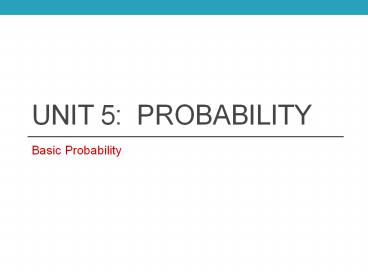Unit 5: Probability - PowerPoint PPT Presentation
1 / 18
Title:
Unit 5: Probability
Description:
UNIT 5: PROBABILITY Basic Probability Sample Space Set of all possible outcomes for a chance experiment. Example: Rolling a Die Probability Model It is a description ... – PowerPoint PPT presentation
Number of Views:53
Avg rating:3.0/5.0
Title: Unit 5: Probability
1
Unit 5 Probability
- Basic Probability
2
Sample Space
- Set of all possible outcomes for a chance
experiment. - Example Rolling a Die
3
Probability Model
- It is a description of some chance process that
consists of two parts - A sample space (S)
- A probability for each outcome
4
Tree Diagram
- A technique for listing the outcomes in a sample
space. It contains branches showing what can
happen on different trials.
5
- Draw diagram of all possibilities of test
performance on three True/False questions.
6
- Draw the tree diagram for winning the best 2 out
of 3 games.
7
Imagine rolling two fair, six-sided dice one
that is red and one that is green. Give a
probability model for this chance process.
8
Event
- It is a subset of the sample space.
- It is usually designated by capital letters, like
A, B, C, and so on.
9
Consider flipping 2 coins
- A both tails
- B at least one head
- Find P(A) P(B)
10
Basic Rules of Probability (dont write yet)
11
Complement
12
Mutually Exclusive (Disjoint)
- Two events are mutually exclusive (disjoint) if
they have no outcomes in common and so can never
occur together.
13
Basic Probability Rules
14
Find the probability
- Rolling a 5
- Choosing a girl in this class
- Drawing a king
15
Two marbles are pulled from a bag holding one
red, one white, one blue, and two green marbles.
Athe blue marble is drawn Ba green marble is
drawn
16
Distance learning courses are rapidly gaining
popularity among college students. Randomly
select an undergraduate student who is taking a
distance-learning course for credit, and record
the students age. Here is the probability model.
Age Group (Yr) 18 to 23 24 to 29 30 to 39 40 or over
Probability 0.57 0.17 0.14 0.12
- Show that this is a legitimate probability model.
- Find the probability that the chosen student is
not in the traditional college age group (18 to
23).
17
Choose an American adult at random. Define two
eventsA the person has a cholesterol level of
240 mg per deciliter of blood (mg/dl) or
above (high cholesterol).B the person has a
cholesterol level of 200 to 239 mg/dl (bordering
high cholesterol)According to the American
Heart Association, P(A) 0.16 and the P(B)
0.29.
- Explain why events A and B are mutually
exclusive. - What is P(A and B)?
- What is P(A or B)?
- If C is the event that ther person chosen has
normal cholesterol (below 200 mg/dl), what is
P(C)?
18
Homework































